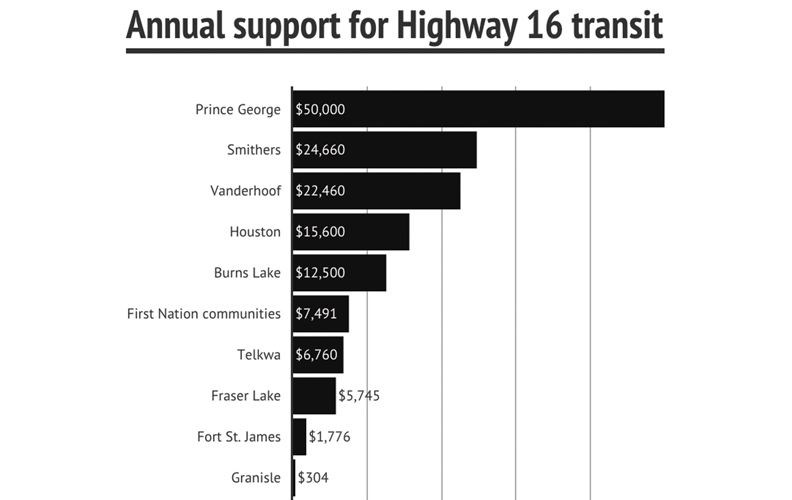Prince George has agreed to put $50,000 toward transit along Highway 16, its portion making up one third of the community commitment for the route starting at Smithers.
Councillors unanimously supported the funding, an amount recommended by the Bulkley-Nechako Regional Transit Committee for Prince George. Other community totals were calculated based on population, but that would have put too much of a burden on the city so it was handed a set amount.
"This makes Highway 16 much safer," said Mayor Lyn Hall, for those who need to travel along Highway 16 but don't have a way.
Though the committee is planning for three years - the time frame the province has agreed to support the service - Monday night's council vote only covers one year and the 2017 operating budget.
A staff report noted that though the Ministry of Transportation has said it would support the Highway 16 Inter-Community Transit Service in the long-term, nothing is firm beyond the three years.
The province has earmarked $2.4 million toward the 750-kilometre route. Tied to that fund, the Ministry of Transportation will cover the capital cost of three buses for the service, the staff report said, but the buses typically last five years.
Operating costs are shared among local government and First Nations that use the service.
"At this time, no indication has been made concerning whether (the Ministry of Transportation and Infrastructure) would fund replacement buses or whether the traditional funding formula of 53.31 per cent local share would apply.
Coun. Albert Koehler said a year at a time is a good approach.
"One has to see how it works out, how it's being utilized," he said. "We'll see where it goes."
Smithers has been asked to give $24,660, Vanderhoof $22,460 and Houston $15,600 among others, for a total of $147,296.
The rates for smaller communities were mainly based on per-person calculations - $5 for communities along the corridor and $1 for off-corridor locations like Fort St. James and Granisle. That formula would have pushed Prince George's share to the $350,000-range.
Hall said it looks like the service will start "later on," likely in the spring.
He and Jillian Merrick, who wasn't at Monday's meeting, both agreed to sit on the committee after Hall's early November update when the city didn't have a clear idea about what was being requested.
At the time Merrick said Prince George had been left out of the conversation, but all councillors were on the same page for Monday's vote.
Coun. Terri McConnachie invoked comments made by Brenda Wilson-John, Carrier Sekani Family Services' Highway of Tears Initiative coordinator.
Prince George is a hub, and destination for many people from small communities, McConnachie said.
"Then they get stuck here," McConnachie said. "That's creating a problem and risky behaviour - danger for folks just trying to get back home."
McConnachie thanked Wilson-John, who was in the audience helping with a presentation about Prince George's first annual Red Dress campaign, to bring awareness to missing and murdered women.
Earlier this year Wilson-John embarked on a 750-kilometre walk from Prince Rupert to Prince George in an effort to cleanse the Highway of Tears.
Eighteen women have been murdered or have disappeared along the stretch - also known as the Highway of Tears - and adjacent routes since the 1970s.
"I think it's been a long time coming so I'm really pleased it's finally coming to be and we'll have transportation in future," added Coun. Murry Krause.



